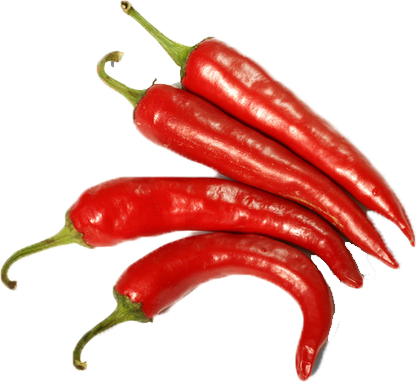|
Although hot and
intolerable, even in small amounts, cayenne are one of the rare spice items
packed with highest concentrations of minerals, vitamins and certain
phyto-nutrients. It is no wonder this wonderful spice has been found place in
modern as well as in traditional medicines for its disease preventing and
health promoting properties.
Cayenne contains
health benefiting an alkaloid compound capsaicin, which gives strong spicy
pungent character. Early laboratory studies on experimental mammals suggest
that capsaicin has anti-bacterial, anti-carcinogenic, analgesic and
anti-diabetic properties. When used judiciously it also found to reduce
triglycerides and LDL cholesterol levels in obese individuals.
Fresh cayenne
peppers, red or green, are rich source of vitamin-C. 100 g fresh chilies
provide about 76.4 mcg or about 127% of RDA. Vitamin-C is a potent water soluble
antioxidant. It is required for the collagen synthesis in the body. Collagen is
the main structural protein in the body required for maintaining the integrity
of blood vessels, skin, organs, and bones. Regular consumption of foods rich in
vitamin C helps body protect from scurvy; develop resistance against infectious
agents (boosts immunity) and scavenge harmful, pro-inflammatory free radicals
from the body.
Cayenne chili
peppers are probably the richest spicy source of vitamin A. Just 100 g of cayenne
has 41,610 IU or astonishingly 1387% of vitamin A. In addition this prized
spice is also home for anti-oxidant flavonoids such as carotenes, lutein,
zeaxanthin and cryptoxanthin. Together, these antioxidant substances in
capsicum helps to protect body from injurious effects of free radicals
generated during stress, diseases conditions.
The spice
contains very high levels of essential minerals. The spice if even consumed in
small quantities regularly would provide sufficient levels of iron, copper,
zinc, potassium, manganese, magnesium and selenium. Manganese is used by the
body as a co-factor for the antioxidant enzyme superoxide dismutase. Selenium
is anti-oxidant mineral
100 g of cayenne
peppers provides 2014 mg or 47% of daily required amount of potassium.
Potassium is an important electrolyte inside the cells and body fluids that
helps controlling heart rate and blood pressure and counter the effects of
sodium.
Cayenne are also
good in B-complex group of vitamins such as niacin, pyridoxine (vitamin B-6),
riboflavin and thiamin (vitamin B-1). These vitamins are essential in the sense
that body requires them from external sources to replenish. B-complex vitamins
facilitate cellular metabolism through various enzymatic functions.
Cayenne peppers
have amazingly very high levels of vitamins and minerals. Just 100 g provides
(in % of recommended daily allowance)
127% of
vitamin-C (Ascorbic acid),
39% of
vitamin B-6 (Pyridoxine),
54% of
niacin,
71% of
riboflavin,
1387% of
vitamin A,
97.5% of
iron,
41% of
copper,
43% of
potassium,
But no
cholesterol.
Rheumatic and
Arthritic Pain: The topical application of
cayenne pepper causes irritation in the applied area, thus helping to distract
the nerves from joint pains due to arthritis.
Good for the Stomach:
A diet containing cayenne pepper helps to avoid stomach aches,
gas, and cramps. Ayurvedic and Chinese medicine recommends mirchi for proper
digestion as it stimulates the flow of stomach secretions and saliva.
Sore Throat: It is said that water mixed with cayenne pepper can be used to
gargle when you have a sore throat. However, many people prefer not to use it
as it is very spicy.
Improves Blood
Circulation: When any body part is sick, the blood flow to
that area is usually affected. Cayenne helps to remove that entire blotch,
stimulates the blood flow, makes sure that the vitamins are properly delivered
to all areas, and guarantees that waste is removed.
Avoid Congestion: Capsaicin stimulates secretions, which helps to clear the mucus
from the nose and lungs by clearing the sinuses and causing sweating. Often, in
villages in India, if a person is congested in the nose or chest/lungs, some
extra mirchi is added to their regular vegetables (bahji) to make them extra
spicy. Tea mixed with cayenne pepper is believed to be good for treating
conditions of cold and flu.
Heart Disease: There has been some research that proves that giving cayenne
extract orally to a patient can help to stop heart attacks. Cayenne helps to
reduce cholesterol levels in the blood and helps to dissolve fibrin, which
causes the formation of blood clots. It also reduces triglyceride levels.
Cures Headaches: Smelling cayenne helps to cure headaches.
Relieves Respiratory
Problems: Cayenne pepper is a source of beta-carotene,
which is helpful in reducing symptoms of asthma.
Boosts Immunity: The Vitamin A, also known as beta-carotene, in cayenne pepper
gives protection against invading pathogens by helping the development of
healthy mucus membranes in the nasal passage, lungs, and urinary tracts,
thereby providing immunity against infections.
Helps Reduce Weight:
Cayenne added to food helps you lose weight with proper
digestion. Therefore, it also reduces excess appetite due to inefficient
absorption of nutrients. On another note, when you eat food that has some extra
spicy mirchi, you tend to drink more water, which can definitely help you lose
a bit of weight, and flush your system out!
Good Antioxidant: The beta-carotene found in cayenne pepper works as a good
antioxidant that prevents or repairs the damage caused by free radicals.
Therefore, it prevents atherosclerosis and colon cancer.
Precaution: Like all other
foods or herbs, we must be careful when using this herb. Excess consumption may
cause burning sensations in the throat, stomach, or rectum.
|

